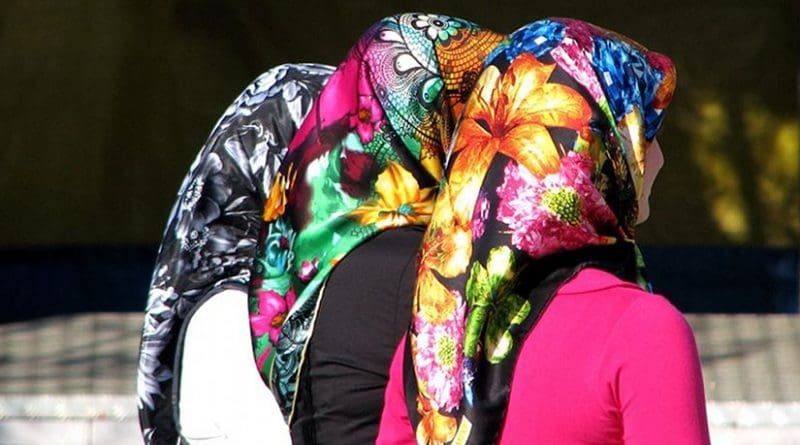Turkey’s Lifting Of Military Headscarf Ban A Boost For Women – OpEd
By Arab News
By Sinem Cengiz*
Turkey on Tuesday marked the 20th anniversary of its Feb. 28, 1997 “post-modern coup,” which drastically changed the lives of thousands of people in the country.
As the first “bloodless” coup in Turkey it did not involve a violent takeover of power — but did ruin the dreams and hopes of those women who wore headscarves.
Turkey has been a secular state since it was founded in 1923. In the 1980s, women in Turkey were banned from wearing headscarves when working in the public sector. This included civil service, educational and political institutions. However, the ban on headscarves in public institutions was extended to all universities in Turkey soon after Feb. 28, 1997, after an edict from the Turkish National Security Council.
The debate over headscarves in universities was the most controversial of all with thousands of women arrested for refusing to remove their headscarf at university entrances or protesting the ban.
It has always been an unforgettable moment in my life, when my classmates who wore headscarves were humiliated when forced to remove them at our university entrance, under the stares of other students. Some even had to quit their education. There is no word that could describe the injustice, humiliation and dashed hopes of these university students, who were deprived of their educational rights because of their beliefs.
This situation changed in 2008 after the Turkish Parliament passed an amendment to the constitution allowing women to wear the headscarf in Turkish university campuses. Finally this disgraceful ban was lifted in 2010. This was followed by the decision to allow women wearing headscarves to work in state institutions in 2013 and the same year four female MPs entered Parliament with their headscarves.
This was a memorable step in Turkish political history. In 1999, in a move to refuse the Security Council’s edict, MP Merve Kavakci attended Parliament’s swearing-in ceremony with her headscarf. However, she was forced out of the Parliament due to a campaign by opposition MPs. Later her parliamentary immunity was stripped and her citizenship was revoked by the Constitutional Court. These all were the impacts of the Feb. 28 process. Today, her sister is a lawmaker at the same Parliament with her headscarf. Even the election of Abdullah Gül in 2007 as Turkish president created intense political turmoil in the country due to his wife’s headscarf.
For many years, the mothers, wives or sisters of tens of thousands of Turkish soldiers could not attend the oath-taking ceremonies of their sons, husbands or brothers because of the strict military rule against the headscarf. One could never forget the heart-wrenching images of the headscarf-wearing mothers shedding tears at military entrances, as they were not allowed to stand by the side of their sons.
For many years, headscarf-wearing women considered themselves as second-class citizens, not only due to state restrictions but also psychological pressure from the secular segment of society.
Today, female officers in the armed forces are allowed to serve their duty with their headscarves. Turkey recently lifted the headscarf ban on female officers working in the general staff and command headquarters and branches. The military was the final institution where women were not allowed to wear headscarf. The move, which was ordered by the Defense Ministry, will come into force once it is published in the Official Gazette.
The lifting of a decades-long restriction on wearing the headscarf in state institutions is a very crucial step in putting an end to human rights abuses that affected the lives and futures of thousands of women in Turkey.
These decisions have nothing to do with harming the secular pillars of modern Turkey. For many years, Turkish people were frightened with the idea that “Turkey is turning into Iran”. But Turkey is no way becoming Iran, and will never. These claims only served the interests of particular segments in the society. Nobody buys this argument any more. Moreover, once you impose bans on people, then you turn into Iran, where women are actually forced to wear hijab.
In order to become a better democracy, the freedom of worship for all citizens whatever their beliefs is essential. Both secular and conservative have equal rights and no citizen should be discriminated against by a section of society just because of their personal beliefs.
Moreover, Turkey’s lifting of its ban on the headscarf comes at a time when a number of countries are debating or have imposed restrictions on traditional head coverings such as the burqa and niqab, which are already banned in France and Belgium, so-called cradles of democracy, liberty and human rights.
Regardless of who is in power, whether the ruling conservative Justice and Development Party or not, essential human rights in Turkey should be protected.
Though this ban should have been lifted before, the move is a case of “better late than never.”
*Sinem Cengiz is a Turkish political analyst who specializes mainly in issues regarding Turkey’s relations with the Middle East. She can be reached on Twitter @SinemCngz

